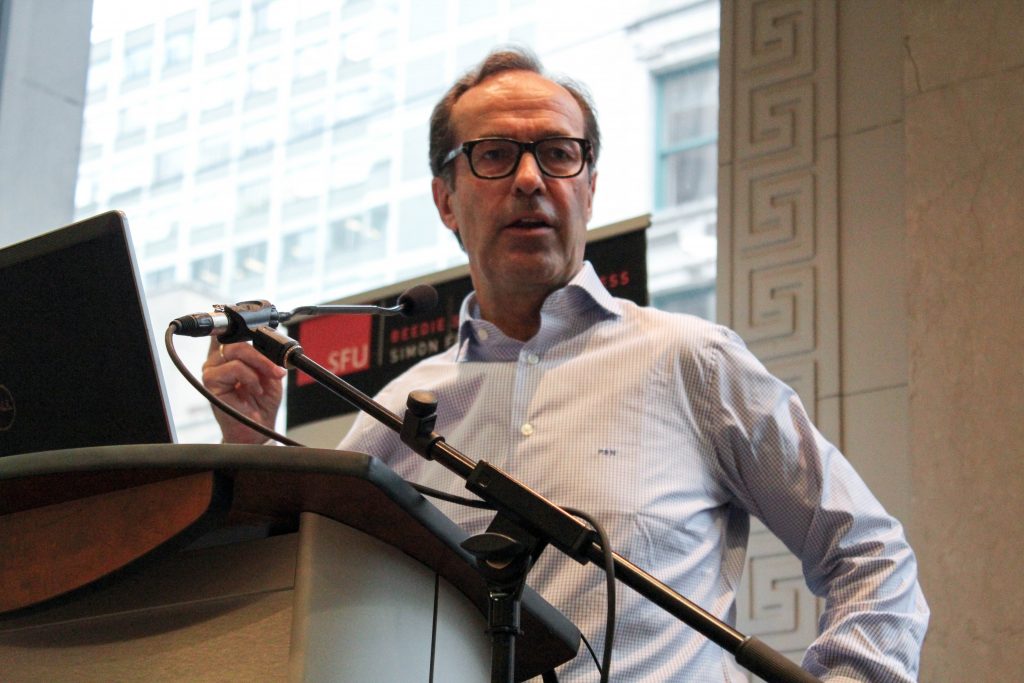SFU alumnus Frode Strand Nielsen: The psychology of investing
Mar 09, 2016

Frode Strand-Nielsen, SFU alumnus and founder and managing partner of leading Nordic private equity investment company FSN Capital.
Developing the mindset of a shrewd investor requires a complex combination of factors, including an appetite for risk, an ability to learn from mistakes, and even luck. Though these factors can largely be taught, it also requires a willingness to make contrarian investments – and it is by resisting the temptation to succumb to the inevitable pressure to follow the herd that brings the greatest returns on investment.
Frode Strand-Nielsen, SFU alumnus and founder and managing partner of leading Nordic private equity investment company FSN Capital, delivered this message at a special event for Beedie School of Business students, faculty, and alumni at the Segal Graduate School on March 4.
FSN Capital currently manages approximately two billion USD for a global client base that includes sovereign wealth funds, pension funds in Australia, Scandinavia, and the US, and the Yale University endowment. The firm has created a culture that radiates integrity, transparency, and trust – all vital in ensuring customers continue to hand over tens of millions of dollars to invest on their behalf.
In looking for investments, FSN Capital looks for potential to double the profits of a company within five years, at which point they sell for double their initial investment. They boost this profit by securing mortgages on the companies they purchase, thereby increasing the profit they make on their initial investment.
The company continually outperforms the base index, thereby earning larger profits. This is the reason clients are willing to trust them with their money, and pay more for their services.
The pitfalls of investing
Strand-Nielsen outlined three main pitfalls in making investments:
- psychological, where there is a tendency to follow the safe route of going with the crowd, which will not result in significant gins;
- the psychology in the room – internal factors such as complacency that can affect the investors ability to select a good investment;
- and what he called “mind the gap”, where investors panic when the unexpected occurs, such as the financial crisis. They then begin to make decisions outside of the framework they usually invest within, inevitably leading to bad results.
“Your biggest enemy in making investments is yourself: you are the one that can make the biggest mistakes,” said Strand-Nielsen. “Humbleness, disrespect for market pricing, too high a regard for one’s own qualifications, and a lack of objectivity are all factors that fall into this category. But the final point is craving risk. You can’t make an investment unless you are willing to take on risks, and some people can’t deal with that.”
Describing how FSN Capital looks at risk, Strand-Nielsen said that it is necessary to build portfolios and companies that are robust enough to withstand a failing event. When matters of risk are low, people typically think that risk is also low – yet this is when risk is actually highest. Risk accumulates through an upturn in the business cycle and materializes in a recession. In this sense, if you start thinking as a contrarian then you start investing and selling at the right times.
“Risk is a multifaceted animal, so we simplified it and put it into two buckets, beta and alpha,” said Strand-Nielsen. “In the beta bucket we put all the risks we cannot control, such as oil prices, commodity pricing, political risk, and weather. We don’t like exposing ourselves to risk we can’t control, and if you go after beta risk you generate beta returns.”
“The alpha bucket is where you have to take risk. In this bucket are integration risk, operational risk, people risk, and governance risk. These are all the risks we have to be good at controlling. If you are going to change the company – which we have to do in order to control profitability – then we actually raise those risks. So we have to have good systems procedures, processes, and governance to control that.”
The “X-factor”
In order to deal with this complexity, the best investors are humble but also competitive, and constantly question their own decisions. They also possess the discipline to make contrarian investments and go against the market. If you are constantly doing something different to the market then it will eventually go wrong, at which point it becomes hard to stay on track and protect your career. Yet if you lose discipline at this stage because of pressure to follow the herd, then that is where things can go really wrong.
Strand-Nielsen mentioned that at this stage, it was important to talk about what he called “the x-factor”, or investment acumen. These are softer factors such as instinct, reflexes, boldness, integrity, and even luck.
“One thing differentiates good investors: the return on luck,” he said. What do you do when you get good luck? And what happens when you are confronted with bad luck? Do you work around it?”
Using his experience of playing soccer as a metaphor, Strand-Nielsen said that he developed good instinct and reflexes by being in great shape. The best games he ever played involved making instinctive decisions – the minute you start to think about what you are going to do on the field, you become an awkward soccer player.
“You are only instinctive when you are in really good shape, and it is the same with investments,” he said. “Investor instinct can be developed, as can good reflexes, but it takes discipline and an open mind to do that. You need to learn from your mistakes. The definition of insanity is doing the same thing over and over again and expecting a different result.”
For information on the Beedie School of Business MSc in Finance program, visit: beedie.sfu.ca/MSc-Finance/
